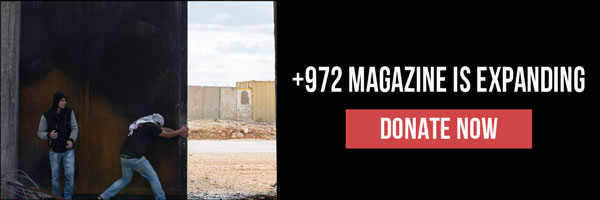The ‘Skunk,’ a foul-smelling liquid most often used to suppress Palestinian demonstrations, is now finding a new target: ultra-Orthodox Jews.
For much of the past year, Israeli forces have been using a foul-smelling liquid shot from a water cannon at high velocity to try and put down a burgeoning protest movement by ultra-Orthodox Jews in Jerusalem. On Sunday, Activestills photographer Oren Ziv captured the weapon, known as the “Skunk,” firing at the protesters, and striking a Palestinian from East Jerusalem who was accidentally caught in the melee.
The protest was held by the followers of Rabbi Shmuel Auerbach, the head of a radical Jerusalem ultra-Orthodox faction that has been resisting IDF attempts to recruit its members, and sometimes even jailing them for failing to show up to army recruitment centers. The “Jerusalem Faction” has held demonstrations across the city since the beginning of the year, and while Israel has been unable to quash the protests, it not for lack of trying. Security forces are sent to suppress the protests, often brutally, which have tended to block Jerusalem’s main thoroughfares.
If you have spent much time in the West Bank over the past decade, the sight and smell of the rectangular, white vehicle spraying putrid liquid at demonstrators is not an uncommon one. Developed as a non-lethal alternative to tear gas canisters and rubber coated steel bullets, the Skunk has been regularly deployed in the Palestinian villages which, beginning in the middle of the last decade, embraced unarmed protest as a means to fight against the occupation, land theft, and the separation wall.
The liquid, reportedly made of yeast, baking powder, and a few other unknown ingredients, smells so bad that even objects such as trees or roads that have been hit often stink for weeks, if not more. A BBC reporter called it the “most foul thing you have ever smelled. An overpowering mix of rotting meat, old socks that haven’t been washed for weeks — topped off with the pungent waft of an open sewer.” Homes struck by the Skunk during protests are often unlivable for weeks. Palestinians would tell me that the only way to remove the stench is by dipping in the sea. That privilege, for the vast majority of them, remains off limits.
The Skunk does not only target Palestinians in the West Bank. Over the past few years, its appearance in Jerusalem and across Israel has grown far more common, with Palestinian citizens of Israel often encountering it in demonstrations in cities and villages. And beyond just a means of crowd control, Israeli security forces have used the weapon to actively disrupt the life of average Palestinians. In 2014, Palestinian residents in the East Jerusalem neighborhoods of A-Tur and Jabel Mukabar handed +972 footage of the vehicle spraying its liquid on entire neighborhoods in the middle of the night — tainting homes, schools, and businesses in the process.
Those videos were shot four months after the Association for Civil Rights in Israel (ACRI) filed a complaint to the police regarding multiple cases of the arbitrary use of the Skunk, which Palestinian activists called collective punishment in response to clashes with youth in the neighborhoods. The police argued that the Skunk is used according to regulations, but refused to actually explain the nature of those regulations.


